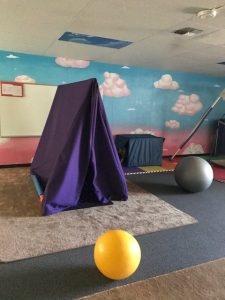Welcome to the Multi-Sensory De-escalation Room

What started as a place to help students manage physical and emotional outbursts has become the starting point for “a lifelong journey to better understand themselves.”
By Bryan D. Mattson
Mountain View Elementary prides itself on having a culture of inclusion. It’s a place where all types of children come to learn, grow, and feel safe. Our school serves students across the district that require a higher level of support than most. A handful of our students have learning challenges and difficulty regulating and managing their emotions. The sights, sounds, and interactions of everyday school life can prove to be overwhelming and often interrupt their learning experience.
As a forward-thinking school, we want to elevate the level of therapeutic intervention available on campus and provide a space where students can go before they have physical or emotional outbursts. When students have an outburst, they can lose between one and two hours of learning time while they get themselves back on track. The loss of learning time is why we created a multi-sensory de-escalation room (MSDR). Now, students can go to the room before they lose control, and take approximately 15 minutes to center themselves.
A Happy and Fun Room
 All activities and equipment in the MSDR help induce a calming state in students without requiring them to talk about or relive the stressors of their school day. The MSDR is a happy and fun room filled with swings, vibrating mats, calming lights, a specially designed music system, a Smart board, an audio system, and a selection of fine motor activities. We were even lucky enough to have a former student and artist design an amazing mural on one of the walls with colors and designs meant to promote calming and wellness.
All activities and equipment in the MSDR help induce a calming state in students without requiring them to talk about or relive the stressors of their school day. The MSDR is a happy and fun room filled with swings, vibrating mats, calming lights, a specially designed music system, a Smart board, an audio system, and a selection of fine motor activities. We were even lucky enough to have a former student and artist design an amazing mural on one of the walls with colors and designs meant to promote calming and wellness.
“De-escalation” is commonly used to mean isolating students in an empty space away from their peers—which we felt never really worked well. At Mountain View, students can only access the space with a school staff member (frequently a para-educator) because the room remains locked throughout the day. When a student needs to de-escalate, a trained staff member takes the student to the MSDR while the teacher remains in the classroom. Students may even bring academic work to the MSDR if they are unable to start or finish it in their regular classroom. They leave the MSDR feeling more in control of their bodies and emotions, and often spend only a short time there. The goal is to de-escalate and reengage in the learning experience as soon as they are ready.
To bridge the communication gap between the para-educator and the classroom teacher, we implemented the Lightspeed Flexcat, an audio pod systems that offers bidirectional communication between the two rooms. The unobtrusive, in-the-moment audio monitoring has significantly enhanced the efficacy of the space. The educators use the Flexcat’s “whisper coaching” feature, where the teacher can listen to the dialogue between the para-educator and student in real time, and offer instantaneous advice to the para-educator. If a student escalates and the para-educator needs additional support, the teacher will hear right away and can respond accordingly.
Laying the Groundwork
The project took four years to complete and was financed by a combination of sources, including money allocated to special education and funds dedicated to furthering the school’s vision. In year one, we started gathering ideas and developing a plan for implementation. The teachers were unsure about using an MSDR, so they joined our principal, Jenny Goldman, to see one at another facility. Years two and three were challenging, as we struggled through school closings, merging of students and classrooms, and modernization of buildings. During this time, we were able to provide all teachers and para-educators with extensive training to prepare for effective use of the space. The school started working with myself, a Pediatric Occupational Therapist, to help bring our ideas to life and purchase the right equipment. By the beginning of year four, we had the space, equipment, and teacher training to effectively use the MSDR.
To ensure the entire school was prepared before we opened the MSDR, all teachers, para-educators, and support staff went through training on how to create a safe school environment and how to create positive adult-child interactions. They gained a deeper understanding of how to be proactive in crisis prevention by watching for triggers, and how to effectively de-escalate situations before they reach the crisis stage. They studied applied brain research, sensory integration, and child development to learn how the tools in the MSDR can help our students relax.
Key staff, including our school psychologist, behaviorists, teacher leaders, and Principal Goldman, participated in a five-day course focused on life space crisis intervention. The course went in depth on different approaches to behavior management, problem solving, and how to use crisis moments as an opportunity to teach and create positive relationships.
Helping Students Understand Themselves
Any school can create an MSDR for its students, but effective training is really what makes the room an effective place for students. This room is not about removing children from their current stressors or isolating them, but taking the opportunity to teach them how to react and deal with stress at the right time. With guidance by trained staff, students learn to choose the input they need when they start to feel overwhelmed by school life. In effect, they are starting a lifelong journey to better understand themselves and enlighten caregivers on how best to provide assistance to them before small crises become larger ones.
At Mountain View, the administrators and staff work together to ensure that every student receives a learning experience that is safe, fun, and inclusive. With our new MSDR, our students with challenges are seeing their rough days become a lot less bumpy.
Bryan D. Mattson, MS, OTR/L, is currently the occupational therapist at Mountain View Elementary in Simi Valley, CA. Mr. Mattson has 23 years of pediatric experience, and has worked in a variety of settings as well as teaching pediatric courses nationally and internationally.
